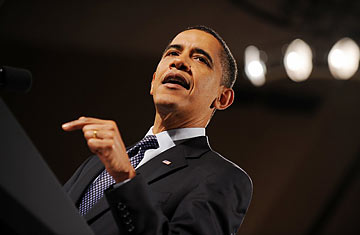
President Barack Obama
After a year with President Barack Obama at the helm of U.S. foreign policy, an observer could be forgiven for concluding that the presidency is more like taking over the controls of a train than getting behind the wheel of a car. That's because you can't steer a train; you can only determine its speed. So far, the menu of foreign policy challenges, and the Administration's response to each, is remarkably similar at the close of 2009 to what it was at the close of 2008.
Obama's promises of outreach to adversaries and consultation and coordination with allies certainly cleared away some of the negative atmospherics left by the Bush Administration. However, his substantial policy positions have proven to be remarkably similar to those of the second-term, chastened-by-reality George W. Bush. Indeed, anti-war Democrats groaned when the President, in his Nobel Peace Prize acceptance speech, referred to "evil in the world" and hailed America's willingness to use force abroad over the past six decades as an essential component of global security. The neoconservatives cheered.
The reality is far more complex than that snapshot, of course, but a survey of Obama's handling of the main strategic challenges appears to affirm the old Cold War dictum that domestic political partisanship ends at the water's edge.
Iraq: By negotiating a Status of Forces Agreement (SOFA) with the Iraqi government shortly before leaving office, Bush made Obama's job a lot easier — because that agreement sets a cast-iron deadline for withdrawing all U.S. troops. Obama may press for an earlier drawdown to free up resources for Afghanistan, but even if he doesn't, the SOFA requires that all U.S. troops be out of Iraq by the end of 2011. Iraq remains far from stable, and the Obama Administration is working through diplomatic channels to cajole the Iraqis into managing their ethnic and sectarian political struggles, but with the same diminished leverage, and therefore limited effect, of the Bush Administration. The moment in which the U.S. was able to significantly change the outcome in Iraq passed sometime before Bush left office; Obama is simply wrapping things up.
Afghanistan: Having proclaimed it "the right war" on the campaign trail, Obama initially sought to lower the benchmark of success to avoid nation-building or expansive counterinsurgency and instead focus narrowly on preventing al-Qaeda from restoring its presence there. But the commander he appointed to take charge of the war, General Stanley McChrystal, warned the White House last summer that the U.S. side was losing in Afghanistan and requested tens of thousands more troops to stop the Taliban's advance. After months of internal debate, Obama opted to send reinforcements, with the hopelessly optimistic caveat that they would begin to come home by mid-2011, when the U.S. would start to hand over responsibility to an Afghan national army that remains largely hypothetical by measure of an independent capability to fight the Taliban. Faced with a strategic choice in Afghanistan, Obama opted to escalate, as Bush would have done — and the smart money says that by the logic of that decision, the Afghan surge is likely to last well beyond the President's current term. Sure, Obama adopted a more confrontational tone than Bush did in addressing dysfunctional allies like Afghan President Hamid Karzai and the Pakistani leadership, but he remains as dependent as Bush was on both, and neither seems substantially less dysfunctional.
Iran: Candidate Obama promised to engage with Iran, pointing out that the Bush Administration's policies of setting ultimatums backed by limited sanctions had failed to slow Iran's nuclear program. The Bush team did, of course, reach out discreetly to Tehran during its final year — though Obama made a far more public show in his Persian New Year message, respectfully addressed to the regime. But the turmoil unleashed by Iranian President Mahmoud Ahmadinejad's contested re-election on June 12 prompted the regime to circle the wagons against alleged "Western plots," imperiling hopes for diplomatic rapprochement. Critics may have chided Obama for declining to grandstand in support of the Iranian opposition, but he has maintained the key demand of the Bush Administration in his approach to Tehran: that Iran halt and then relinquish its uranium-enrichment program. The Iranians refused to do that for Bush, and they are united across their own political divisions in saying no to the same demand from Obama. Now Obama finds himself setting ultimatums and threatening sanctions — with no obvious prospect of greater success than his predecessor.
